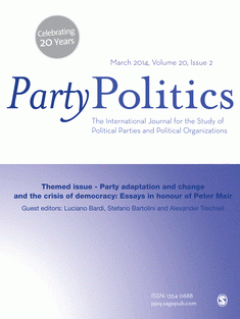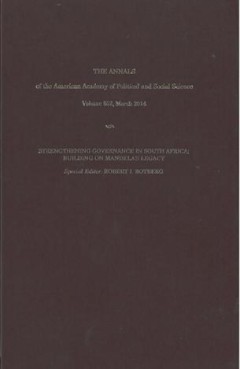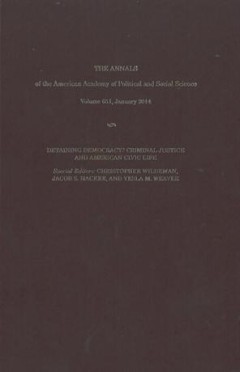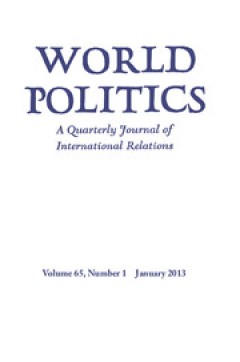Filter by

Media dan pelayanan publik: karya jurnalisme pemenang fellowship peliputan me…
- Edition
- 1st edition
- ISBN/ISSN
- 978-979-9381-07-1
- Collation
- xv, 230p.; 21 cm
- Series Title
- -
- Call Number
- 354.598 GAB k
- Edition
- 1st edition
- ISBN/ISSN
- 978-979-9381-07-1
- Collation
- xv, 230p.; 21 cm
- Series Title
- -
- Call Number
- 354.598 GAB k

The practice of adaptive leadership: tools and tactics for changing your orga…
When change requires you to challenge people's familiar reality, it can be difficult, dangerous work. Whatever the context--whether in the private or the public sector--many will feel threatened as you push though major changes. But as a leader, you need to find a way to make it work. Ron Heifetz first defined this problem with his distinctive theory of adaptive leadership in Leadership Without…
- Edition
- -
- ISBN/ISSN
- 978-1-4221-0576-4
- Collation
- xvi, 326p.; 24 cm
- Series Title
- -
- Call Number
- 658.4 HEI p

HBR's 10 must reads on leadership
If you read nothing else on leadership, read these 10 articles(featuring "What Makes an Effective Executive,� by Peter F. Drucker). We've combed through hundreds ofHarvard Business Review articles on leadership and selected the most important ones to help you maximize your own and your organization's performance. HBR's 10 Must Reads On Leadership will inspire you to: - Motivate others to …
- Edition
- -
- ISBN/ISSN
- 978-4221-5797-8
- Collation
- v, 217p.; 21 cm
- Series Title
- -
- Call Number
- 658.4 HAR h

Campaigns & elections: rules, reality, strategy choice
This new text, written by a respected author team, makes a contemporary approach to campaigns and elections accessible and engaging. Based on the authors own courses, Campaigns & Elections uses a clear, consistent framework to help students understand the strategies and choices involved in American campaigns and elections. With coverage of elections at the presidential, congressional, state, an…
- Edition
- -
- ISBN/ISSN
- 978-0-393-93262-1
- Collation
- xii, 397p.; 23 cm
- Series Title
- -
- Call Number
- 324.7 SID c

Education nation: six leading edges of innovation in our schools
As a result of constant innovation, learning is no longer limited by traditional confines and we're moving beyond students tied to their chairs, desks, and textbooks-and teachers locked away in classrooms. In Education Nation author Milton Chen draws from extensive experience in media-from his work on Sesame Street in its nascent years to his role as executive director of the George Lucas Educa…
- Edition
- 1st edition
- ISBN/ISSN
- 978-0-470-61506-5
- Collation
- xxii, 296p.; 24 cm
- Series Title
- -
- Call Number
- 371.2 CHE e

Konsep-konsep pemberdayaan masyarakat: acuan bagi aparat birokrasi, akademisi…
- Edition
- -
- ISBN/ISSN
- 979-498-563-5
- Collation
- xi, 398p.; 24,5 cm
- Series Title
- -
- Call Number
- 361.2 MAR k
- Edition
- -
- ISBN/ISSN
- 979-498-563-5
- Collation
- xi, 398p.; 24,5 cm
- Series Title
- -
- Call Number
- 361.2 MAR k

Masyarakat Adat dalam pusaran perubahan
- Edition
- -
- ISBN/ISSN
- -
- Collation
- ii, 129p.; 16 cm
- Series Title
- -
- Call Number
- 307.7 KEM m
- Edition
- -
- ISBN/ISSN
- -
- Collation
- ii, 129p.; 16 cm
- Series Title
- -
- Call Number
- 307.7 KEM m

Peduli Adat dalam bingkai inklusi
- Edition
- -
- ISBN/ISSN
- -
- Collation
- 49p.; 17 cm
- Series Title
- -
- Call Number
- 307.7 KEM p
- Edition
- -
- ISBN/ISSN
- -
- Collation
- 49p.; 17 cm
- Series Title
- -
- Call Number
- 307.7 KEM p

Managing Indonesia's remaining forests: compilation of opinions 2014-2016
- Edition
- 1st edition
- ISBN/ISSN
- 978-602-18190-1-2
- Collation
- xiv, 146p.; 21 cm
- Series Title
- -
- Call Number
- 333.7 PUR m
- Edition
- 1st edition
- ISBN/ISSN
- 978-602-18190-1-2
- Collation
- xiv, 146p.; 21 cm
- Series Title
- -
- Call Number
- 333.7 PUR m

Party Politics, Volume 22, Issue 6, November 2016
- Edition
- -
- ISBN/ISSN
- 13540688
- Collation
- -
- Series Title
- -
- Call Number
- -
- Edition
- -
- ISBN/ISSN
- 13540688
- Collation
- -
- Series Title
- -
- Call Number
- -

Party Politics, Volume 22, Issue 5, September 2016
- Edition
- -
- ISBN/ISSN
- 13540688
- Collation
- -
- Series Title
- -
- Call Number
- -
- Edition
- -
- ISBN/ISSN
- 13540688
- Collation
- -
- Series Title
- -
- Call Number
- -

Environmental Ethics, Volume 38, Number 1, Spring 2016
- Edition
- -
- ISBN/ISSN
- 01634275
- Collation
- -
- Series Title
- -
- Call Number
- -
- Edition
- -
- ISBN/ISSN
- 01634275
- Collation
- -
- Series Title
- -
- Call Number
- -

Journal of Public Administration Research and Theory, Volume 26, Number 4, Oc…
- Edition
- -
- ISBN/ISSN
- 10531858
- Collation
- -
- Series Title
- -
- Call Number
- -
- Edition
- -
- ISBN/ISSN
- 10531858
- Collation
- -
- Series Title
- -
- Call Number
- -

The Annals of the American Academy of Political and Social Science, Volume 66…
- Edition
- -
- ISBN/ISSN
- 00027162
- Collation
- -
- Series Title
- -
- Call Number
- -
- Edition
- -
- ISBN/ISSN
- 00027162
- Collation
- -
- Series Title
- -
- Call Number
- -

The Annals of the American Academy of Political and Social Science, Volume 66…
- Edition
- -
- ISBN/ISSN
- 00027162
- Collation
- -
- Series Title
- -
- Call Number
- -
- Edition
- -
- ISBN/ISSN
- 00027162
- Collation
- -
- Series Title
- -
- Call Number
- -

Environmental Ethics, Volume 38, Number 2, Summer 2016
- Edition
- -
- ISBN/ISSN
- 01634275
- Collation
- -
- Series Title
- -
- Call Number
- -
- Edition
- -
- ISBN/ISSN
- 01634275
- Collation
- -
- Series Title
- -
- Call Number
- -

Administrative Science Quarterly, Volume 61, Number 3, September 2016
- Edition
- -
- ISBN/ISSN
- 00018392
- Collation
- -
- Series Title
- -
- Call Number
- -
- Edition
- -
- ISBN/ISSN
- 00018392
- Collation
- -
- Series Title
- -
- Call Number
- -

Administrative Science Quarterly, Volume 61, Number 4, December 2016
- Edition
- -
- ISBN/ISSN
- 00018392
- Collation
- -
- Series Title
- -
- Call Number
- -
- Edition
- -
- ISBN/ISSN
- 00018392
- Collation
- -
- Series Title
- -
- Call Number
- -

Gender & Development, Volume 24, Number 3, November 2016
- Edition
- -
- ISBN/ISSN
- -
- Collation
- -
- Series Title
- -
- Call Number
- -
- Edition
- -
- ISBN/ISSN
- -
- Collation
- -
- Series Title
- -
- Call Number
- -

World Politics, Volume 68, Number 4, October 2016
- Edition
- -
- ISBN/ISSN
- 00438871
- Collation
- -
- Series Title
- -
- Call Number
- -
- Edition
- -
- ISBN/ISSN
- 00438871
- Collation
- -
- Series Title
- -
- Call Number
- -
 Computer Science, Information & General Works
Computer Science, Information & General Works  Philosophy & Psychology
Philosophy & Psychology  Religion
Religion  Social Sciences
Social Sciences  Language
Language  Pure Science
Pure Science  Applied Sciences
Applied Sciences  Art & Recreation
Art & Recreation  Literature
Literature  History & Geography
History & Geography